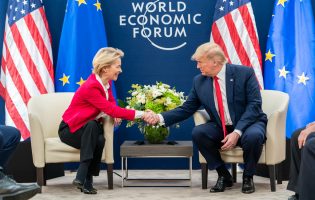Germany, the Ukraine Crisis, and the Future of Euro-Atlantic Security
In advance of Chancellor Angela Merkel’s visit to Washington, DC, on 2 May 2014, Dr. Markus Kaim, Head of the Research Group for Security Policy at the Stiftung Wissenschaft und Politik (SWP), and Dr. Hannes Adomeit, DAAD Research Fellow at AGI, discussed the political implications of the chancellor’s visit for the crisis in Ukraine and Euro-Atlantic security. In light of the necessity of a common Western approach to the crisis, the presentations and discussions focused on the question as to whether Chancellor Merkel would be able to strike a consensus with President Obama. Will her visit pull the transatlantic relationship closer together or push it further apart? Where are the points of agreement and contention between Washington and Berlin? Are the sanctions placed on Russia effective? Furthermore, what approach should the West take to Russia tactically and strategically? The discussion shed light on just how precarious the situation in Ukraine is—not just in Ukraine itself, but for German-U.S. relations, Euro-Atlantic security, Russia, and the world at large.
The key point for the implications for international security via Germany’s Russia policy was that recent events have highlighted an overall discord of the basic foundation of Germany’s Russia policy for the past decade. This has become overwhelmingly apparent in Chancellor Merkel’s modest approach to the issue and comes down to a political juxtaposition between Merkel and Obama: Obama’s idealism versus Merkel’s Realpolitik, or a win-win calculation versus a zero-sum game, which will most likely continue even during her visit to Washington. It remains unclear whether we are seeing the Euro-Atlantic order engaged in a transition from a multilateral order to a multi-polar order, where a powerful Germany in international relations rests on the existence of rules, treaties, regulations, institutions, and negotiations because Germany will not become a military power.
The current sanctions placed on Russia are a double-edged sword, in which Germany and the EU will also be victims of these sanctions due to the economic interdependence of our globalized world. The question was raised whether there is and will be agreement in the medium to long term as it relates to issues of energy dependence. Additionally, a common understanding about the necessity of sanctions and the extent of sanctions is necessary between the U.S. and the EU, especially because the sanctions themselves differ in their relatively small effect from the collateral or de facto repercussions of sanctions, which are more serious. European economic stability does not exist in a vacuum without Russia; therefore, sanctions on Russia also expose economic interdependence in Europe and globally. This is a painful wake-up call on the global constraints of the capacity of nation-states to influence other nation-states through economic sanctions. One of the conclusions was that economic interdependence favors institution-building and cooperation in the long term and that is Germany’s preferred approach to dealing with Russia.
The current crisis will furnish the paradigm for years to come for Germany, the EU, and NATO for providing and exporting stability to the European periphery. There is a security vacuum in Eastern Europe; this will continue to be the key question for months to come and this hinges on the May 25 elections in Ukraine. What can NATO offer Ukraine? Germany is not ready to provide additional military components and an enlargement of NATO might alienate Russia. While the idea of a “Finlandization” of Ukraine is heralded in some circles, it should include a security guarantee. However, it is not clear who could provide this.
Please contact Ms. Kimberly Frank with any questions at kfrank@aicgs.org.
DATE: Tuesday, April 29, 2014
TIME: 4:30 – 6:00pm
LOCATION: AGI, Suite 700, R.G. Livingston Conference Room, Massachusetts Avenue, NW, Washington, DC 20036
Relevant articles:
“On Morality and Mistakes: Did the West Provoke Russia over Ukraine?” by Anne Marie Le Gloannec
“Ukraine: Another Test for Europe – and the United States” by Jackson Janes
“Outgunned and Without Friends” by Elizabeth Pond







